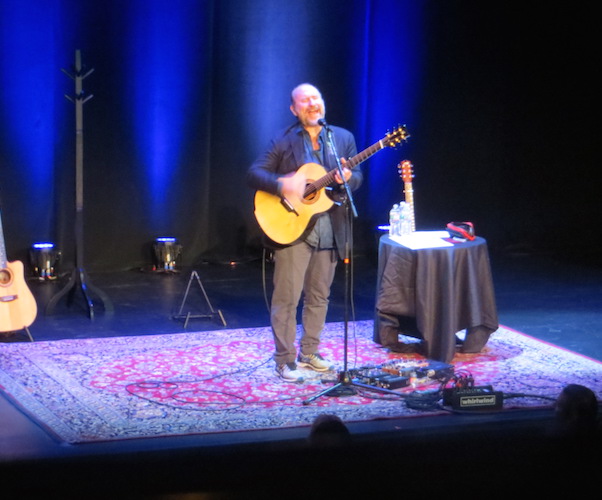Concert Review: Men at Work’s Colin Hay — Solo Success Achieved
Colin Hay need no longer worry about job security as a touring and recording artist.

Colin Hay performing at Boston’s Wilbur Theater. Photo: Blake Maddux.
By Blake Maddux
Last October, Australian superstar Sia performed at TD Garden. I cannot confirm that the show was sold-out.
Last Friday, her uncle played in Boston. If the venue’s website is confirmation enough, then I can say for sure that his show was.
“Wait,” you say. “Colin Hay is Sia’s uncle?”
Yes, he is. Since TD Garden’s capacity for concerts is probably 15 times that of The Wilbur, both will have bragging rights at the next family reunion.
The Scottish-born Hay was the lead singer of Men at Work, an Australian quintet whose 1982 album Business As Usual spent 15 consecutive weeks at #1, thereby breaking the record set by The Monkees in 1966 for the longest run by a debut in that position. (Business As Usual’s record has itself been eclipsed.)
In January 1983, the band simultaneously had the #1 single (“Down Under”) and #1 album in both the United States and the United Kingdom. In May of that year, Business As Usual and its follow-up, Cargo, were in the Billboard top 10 together for two weeks. Both of these are exceedingly rare feats, especially for a group in such an early stage of its career.
Unsurprisingly, Men at Work won the Grammy Award for Best New Artist of 1982, an honor that Lily Tomlin and Tony Bennett presented to them. (Here’s where Uncle Colin has his niece beat: although Sia has received eight nominations, she has not yet taken a Grammy home.)
After the band broke up in late 1985, Hay—like many lead singers and principal songwriters of successful bands—found success on his own elusive.
In the 2015 documentary of which he is the subject, Waiting for My Real Life, Hay recalls a gig that not a single paying customer attended. Thus, although he had all of the money and—presumably—name recognition that a musician could hope for, neither was helping him sell records or tickets.
Although he may still wake from unpleasant dreams of playing to empty rooms, the reality is that Hay need no longer worry about job security as a touring and recording artist.
Taking a stage adorned only by three guitars, a table, and an unutilized coat rack, the 63-year-old thanked the attendees before teaching them the refrain in the chorus of “Come Tumblin’ Down,” which is the opening track of his eyebrow-raising new album, Fierce Mercy.
As beguiling as ever, Hay captivated the audience early in the evening with poignant stories of his late parents, saying of his father, “Daddy, you’re still killing” after recounting an amusing episode from his youth.
The crowd sat in politely spellbound silence during the less familiar songs, which in the first half of the show dated back to the title track of his 1987 solo debut, Looking for Jack, which Hay explained was about a real-life encounter with Mr. Nicholson at LA’s Greek Theatre in 1986.
Those in attendance were rightfully reverent at other times, slinging words of affection—“We love you Colin!”, “You’re the best!”—and singing along when invited or when they knew each and every word.
However, when Hay introduced a new song called “Secret Love” by saying that he always wanted to write a song that became a gay anthem, someone distastefully shouted, “Down Under.” Later on, an apparently first-time concertgoer yelled, “Free Bird.” Thankfully, the Man at Work cleverly diffused the obnoxiousness by replying, “I don’t know ‘Free Bird.’ I should probably learn it.”
At the show’s midpoint, Hay introduced “Who Can It Be Now?” by explaining, to paraphrase, “Here’s one by my old band so that you know you’re at the right show.”
The fact that he dutifully treated the audience to “Down Under,” “Who Can It Be Now?”, and “Overkill” was to be expected. Still, almost any combination of three or four Men at Work songs would have been equally satisfying. Given the consistent quality of his solo material, Hay shouldn’t feel the need to overfill his set with songs from multi-million-selling albums. However, it would be pretty cool if he had selected some deeper cuts from his old band’s catalog.
While none of his selections from his “old band” were surprising, his 19th and final song of the evening was unusual. Noting it’s appropriateness for St. Patrick’s Day, Hay held in his hand the lyrics to a traditional Scottish song called “The Parting Glass.”
The a cappella presentation of this last number was ample demonstration of Hay’s enduringly fine voice. Some singers’ accents can be impenetrable to American ears, but seem to vanish the moment that they start singing. This is not quite the case for Hay, but the Scottish and Australian elements have always made his sound distinctively rich, like an exotic wine rather than the domestic variety.
Overall, this was a no-frills show. But when you have the songs, stories, and personality that Colin Hay does, who needs ‘em?
Blake Maddux is a freelance journalist who also contributes to The Somerville Times, DigBoston, Lynn Happens, and various Wicked Local publications on the North Shore. In 2013, he received an MLA from Harvard Extension School, which awarded him the Dean’s Prize for Outstanding Thesis in Journalism. A native Ohioan, he moved to Boston in 2002 and currently lives with his wife in Salem, Massachusetts
